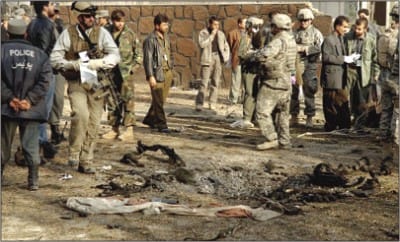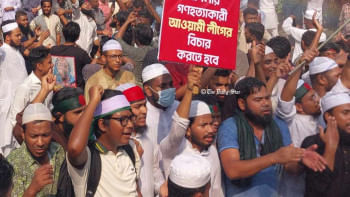The new US Afghanistan-Pakistan plan

Photo: AFP
OBAMA'S plan, announced on 27th March, for defeating Al Qaeda and Taliban in Afghanistan and Pakistan is based on hard realism. He has come to the basics when he said that "we are not in Afghanistan to control that country or dictate its future but to disrupt, dismantle and defeat Al Qaeda in Pakistan and Afghanistan."
Obama's plan has four aspects:
(a) He wants to bring other regional players in the discussion, including Iran and Russia,
(b) He plans to send hundreds of civilians to develop new jobs in Afghanistan and an economy not tied to poppy production,
(c) He wants to provide $1.5 billion every year to Pakistan to build schools, hospitals and roads.
(d) He wants the so-called moderate Taliban to abandon their hard-line leaders.
Obama's plan is essentially to win the hearts and minds of Afghans and Pakistanis. America cannot defeat the extremists if Afghans and Pakistanis don't see their lives improve. Unemployment, deprivation, desperation and lack of social justice lead youths to join the extremist organisations.
The Bush administration removed the Taliban from power in 2001 from the major cities but did not diminish their influence in the countryside. Seven years later the Taliban and Al Qaeda are stronger than ever in both countries. Talibans are getting stronger in north, east, and west, creeping steadily toward the capital city, Kabul. Sources close to Talibans say that they pay US $8 dollars a day to fighters while Afghan National Army fighters are paid US $4 a day.
Talibans have almost occupied the Federal Administered Area in Pakistan and the government had to conclude an agreement with them. Despite that, the recent attacks on Sri Lankan Cricket team, suicide bomb attack on a Pakistani mosque during Friday's prayer and on the Police Training Academy in Lahore are visible manifestation of its resurgence in brutal form.
Talibans have the money, the weapons and have the determination and if they die, they know they will go to heaven. What else can motivate a person than these factors, although their goal is totally misplaced and contrary to the true teachings of Islam.
It is reported that Taliban has become more radical, more sophisticated and more brutal than the Taliban ousted by US-led forces in 2001. Tactics have been imported from Iraq such as suicide bombers and remote controlled roadside bombs. Today they reportedly use guerrilla-style strikes, not confronting face to face. One Taliban told that "in this country, there are many religious people and they want a reason to fight for God, for martyrdom. They welcome this opportunity to go to paradise." The production and export of opium has increased enormously and IMF estimates it about US$ 6 billion and Taliban encouraged it for funds.
Bush committed two political mistakes. First he abandoned the necessary war in Afghanistan for the ill-conceived war of choice in Iraq. Second, he was vague when he talked about representative democracy in Afghanistan. It was understood that the two campaigns - military and political/economic - had to go forward together; the success of each depended on the other. But the vision of a reconstructed, peaceful, stable, democratically governed Afghanistan faded fast. Most Afghans now believe that it was nothing but a cover story for the Bush administration's real goal - to set up permanent bases in Afghanistan and occupy the country forever.
Whatever the truth of the matter, in the long run, it is not soldiers but services that count - electricity, water, food, health care, justice, and jobs. Had the US delivered the promised services on time, while employing Afghans to rebuild their own country according to their own priorities and under the supervision of their own government, they would now be in charge of their own defence. The forces on the other side, which we loosely call the Taliban, would also have lost much of their grounds for complaint.
An Afghan businessman, who has worked on American projects, insisted that when Bush pledged $10.4 billion in aid, President Karzai should have offered him a deal: "Give me $2 billion in cash, I'll kick back the rest to you, and you can take your army and go home."
"If Karzai had put the cash in an Afghan bank," the businessman added, "and spent it himself on what people really need, both Afghanistan and Karzai would be in much better shape today." Though he was half-joking, he wasn't wrong. Endemic corruption among the Karzai administration has depleted the US money.
India's increasing influence in Afghanistan perturbs Pakistan. It is heavily investing in Afghanistan and the "great game" has been taking place between India and Pakistan in creating its sphere of influence in Afghanistan comparable to that between Russian Empire and British Empire for supremacy in Afghanistan during the nineteenth century.
India has come in a big way to assist Afghanistan. It is constructing the new Afghan Parliament in Kabul with an estimated cost of $US 1 billion dollar, building roads and opened two consulates in cities near Pakistan's border since 2001. It dispatched hundreds of professionals including teachers, trainers and doctors in Afghanistan. Pakistan's perennial fear is of being squeezed between India on one flank and an Indian-dominated Afghanistan on the other. Strategically, Pakistan can not let it occur because politically it is a suicide for it.
To counter this uncomfortable squeeze, Pakistan's intelligence agencies are likely to provide assistance to extremists in Afghanistan so that India does not succeed to hold sway over Afghanistan. Furthermore, until the Kashmir issue is resolved, 'jihadis' will continue to target soft spots in India. To an average Pakistani, India poses a great threat to its security than a Taliban-dominated Afghanistan.
Some say America encouraged influence of India over Afghanistan and President Karzai is more at ease with India than with Pakistan. Critics say that Obama's plan fails to address the strategic concern of Pakistan. The US should advise India to back off in Afghanistan. Unless geostrategic interests and disputes of the region are taken into account, experts say Obama's new plan may face stumbling blocks in the coming months in both Afghanistan and Pakistan.
Obama's plan to pour in more resources including additional soldiers to Afghanistan, according to many strategists, is comparable to Kennedy's gradual involvement into what would become the mother of all quagmires, Vietnam. Obama's commitment to Afghanistan is not really shared by European countries, except Britain. The world has changed since 1945, when Big-2 (US and UK) used to decide the fate of the free world. By the end of 20th century, Big -2 became G-7 and by the 21st century it has been replaced by G-20 countries.
The author is former Bangladesh Ambassador to the UN, Geneva.

 For all latest news, follow The Daily Star's Google News channel.
For all latest news, follow The Daily Star's Google News channel. 



Comments